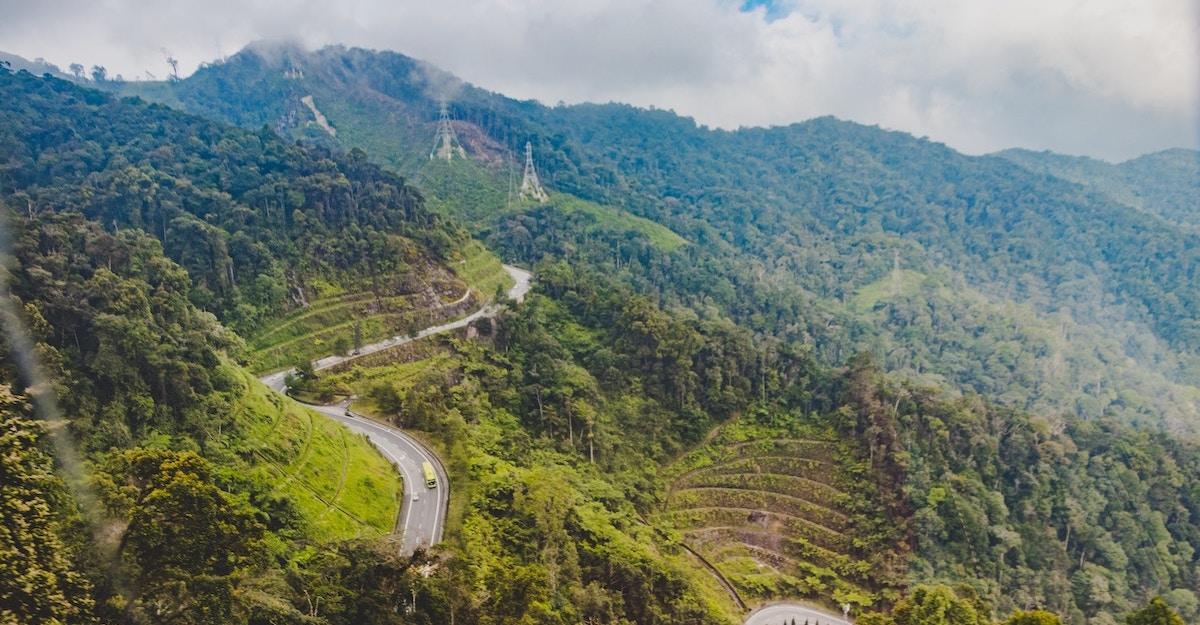Hill Resorts Travel Guide
Perched on rich green expanses amid fresh mountain air and breathtaking tropical jungles, Malaysia's charming hill resorts offer respite from the country's famous heat and humidity. Each of them has a range of activities, attractions and accommodation, meaning visitors can look forward to refreshing experiences above the clouds.
The Cameron Highlands is the largest and most refined of the hill resorts, and its cool climate is favourable for crops. Indeed, it's known as Malaysia's 'Green Bowl', supplying the country with a variety of fruit and vegetables. Genting Highlands is the most developed resort, and is a popular weekend getaway for Kuala Lumpur residents. By contrast, the natural surroundings of the smallest resort, Fraser's Hill, provide peace and tranquility. Bukit Larut is the least visited and the least developed, preserving the ambience of a traditional colonial hill station with its quiet atmosphere and modest accommodation.
Things to do in Hill Resorts
Though once reserved for colonial officials and their families, Malaysia's hill stations have become popular destinations among locals and tourists alike. Scenic and refreshingly cool, the old stations offer visitors an enticing range of experiences, from leisurely forest walks in settings characterised by colonial quaintness to luxury resorts.
Bukit Larut, or Maxwell Hill, is the oldest hill refuge, and is a peaceful, old-fashioned place. Cameron Highlands is the largest hill resort and has been well developed for tourism, retaining some British traditions, but also encouraging commercialisation. Fraser's Hill is the preferred station for nature lovers, offering extensive hiking trails and natural attractions, with development limited to protect the rainforest. The Genting Highlands is a glitzy resort playground of casinos and theme parks, and bears no resemblance to the hill stations of old. Penang Hill is another popular resort. Also called Bukit Bendera, it has phenomenal views over Georgetown and the Penang Bridge.
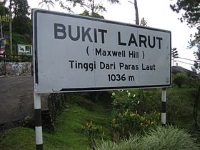
Bukit Larut
Formerly known as Maxwell Hill, the holiday retreat of Bukit Larut is Malaysia's oldest hill station. Situated in the wettest part of the country, the peaceful site's history stretches back to 1884, and the area is blessedly cool compared to the lowlands.
Limited accommodation and a lack of development give the destination an old-world colonial charm, which the more popular hill stations no longer have. Eight charming bungalows nestle on the hillside, providing the area's only holiday lodging.
The route to the top of the hill station is an exhilarating climb through virgin tropical jungle. Travellers will need a four-wheel drive to undertake the journey. Private vehicles are not permitted, though a government-owned Land Rover makes regular trips up between 7am and 6pm. Visitors can enjoy magnificent panoramic views of the Malaysian peninsula's west coast from the summit. The vista runs from Penang to Pangkor.
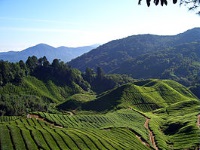
Cameron Highlands
Located at the northwestern edge of Pahang state, the Cameron Highlands hill station is the largest of its kind in Malaysia, and the fertile region is home to a scattering of villages and terraced plantations. Visitors will enjoy the scenic drive along the area's main route, during which they can stop at the stunning Lata Iskandar Waterfalls and Kuala Woh Forest Recreation Park.
They can also stroll through Brinchang's market square, potter around handicraft stores, or sample the peace at Buddhist Temples. Ringlet and Tanah Rata are worth exploring for lovers of quaint towns; trips to tea plantations and strawberry farms are popular as well.
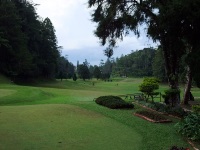
Frasers Hill
Louis James Fraser was a controversial, solitary figure, who set up camp on one of the seven hills' cool, lush summits. The area became known as Fraser's Hill. The Scottish pioneer and opium-den operator disappeared under mysterious circumstances before the area's potential as a hill station was recognised. Others followed him and investigated the site, ultimately finding it perfect for a highland retreat.
The area lies in the state of Pahang and is north of the Genting Highlands. Situated around 5,000 feet (1,524m) above sea level, it is the only hill station within two hours' drive of Kuala Lumpur. Nature lovers and bird enthusiasts will enjoy the cool, serene region.
Jungle trails, waterfalls and colourful nurseries nestle peacefully in the landscape, complementing golf courses and horse-riding routes. Visitors will also find extensive hiking trails. Travellers can choose from a range of chalets, hotels, and colonial bungalows.
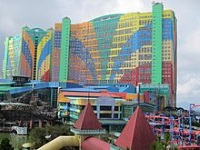
Genting Highlands
The Genting Highlands holiday resort has none of the old-world, colonial atmosphere of Malaysia's other hill stations. Instead, its main purpose is to entertain Kuala Lumpur's more affluent citizens, chiefly through the presence of the country's only legal, land-based casino, a number of hotels, and a handful of theme parks. Visitors will also find a horse ranch, a golf course and an artificial lake.
The hill resort lies less than one hour's drive from Kuala Lumpur, though holidaymakers can reach it via a cable car called the Genting Skyway. At 6,562 feet (2,000m) above sea level, the hill station's temperate conditions offer a welcome respite from Malaysia's humidity. However, its vibrant nightlife can account for the temperature rising in other ways.
Malaysia travel info
Electricity
The electrical current is 240 volts, 50Hz. UK-style three-pin plugs are used.
Language
Bahasa Melayu is the national language, but English is widely spoken and is the language of business. Mandarin, Cantonese, Hokkien and Hakka are spoken by the Malaysian Chinese population and Tamil, Malayalam and Hindi among the Indian population.
Money
The official currency is the Malaysian ringit (MYR), also referred to as the Malaysian dollar, which is divided into 100 sen. Money changers are generally quicker to deal with than banks and do not charge commission; their rates however are variable. British pounds or US dollars are the easiest to exchange. All major credit cards are accepted at upmarket hotels, shops and restaurants. ATMs are widely available.
Tipping
Although tipping is not customary in Malaysia, the more expensive hotels and restaurants add a 10 percent service charge to their bills and further gratuity is unnecessary. All hotel rooms are subject to a six percent government tax, though many cheaper hotels quote a price inclusive of this tax.
Health
Some tropical illnesses are prevalent in Malaysia and travellers should seek medical advice regarding any recommended vaccinations before travelling. Hepatitis A and hepatitis B are common, as is dengue fever.
Malaria risks are isolated to the inland regions; the exception is Sabah, where there is a year-round risk. Travellers who are arriving from or have transited through infected areas require a yellow fever vaccination certificate.
Visitors may also be advised to get vaccinations for rabies, typhoid and Japanese encephalitis, depending on their travel itineraries in Malaysia. It's best to drink bottled water and avoid uncooked meat, fish and vegetables, unpeeled fruit, ice and salads.
A further health hazard in Malaysia is smoke haze and air pollution, particularly in Kuala Lumpur, which has some of the poorest air quality in Asia. The very high Benzene pollution levels could aggravate cardiac or respiratory problems. Hospitals in Kuala Lumpur and other major Malaysian cities are of a high standard but medical facilities may be lacking in rural areas. Comprehensive medical insurance is recommended.
Safety
Malaysia is a generally safe travel destination, but visitors should nevertheless take normal precautions against crime. They should stay alert and avoid displaying conspicuous wealth, and should also be wary of petty crimes such as bag-snatching and pick-pocketing. Tourists should use hotel safes and duplicate travel documents. Remote parts of eastern and northern Sabah carry some threat of kidnappings by militant Filipino groups.
Local customs
Malaysia is largely Muslim and so Islamic customs should be respected, especially during the month of Ramadan when eating, drinking and smoking in public should be avoided, as it is forbidden by Islamic law. Dress, particularly for women, should be conservative, and arms and legs should be covered when visiting places of worship. It is customary to remove shoes before entering homes and places of worship. When eating or exchanging money, the right hand is used. Homosexuality is illegal.
Doing business
Those looking to do business in Malaysia are strongly urged to research some of the cultural complexities of the country, which is home to different ethnic groups. Although the Malaysian business world has largely succeeded in establishing a unified ethos for itself, it is important to understand that visitors might deal with people from different ethnic groups (Malay, Chinese and Indian being the most common), and that their expectations and conduct might need to adjust accordingly. The defining characteristic of business culture in Malaysia is respect for, and deference to authority. Authority figures are identified more by skills, wisdom and temperament, than by powerful positions and strict hierarchy.
The Malaysian style of management, it follows, is less goal-driven, and more holistic, than in some Western cultures, with managers taking a personal interest in the well-being of their employees. Business etiquette in Malaysia is marked by sensitivity and diplomacy. The golden rule is never to cause another to 'lose face' in professional company; the wilful, or even careless, humiliation of even a subordinate, is considered anathema in the Malaysian business world. Business meetings in Malaysia usually convene punctually, but can be subject to a lot of 'small talk' and personal digressions. Attendees shouldn't get impatient, as this is seen as an important function of meetings in Malaysia, where the agenda is not always as important as the relationships between people that meetings serve to develop.
Business cards are usually exchanged upon meeting new associates. People give and receive cards with their right hand, supported by the left, and never fold or put away a card without looking at it first. Details are printed in Chinese on the reverse side of cards. The dress code for business is typically Western, with smart, formal clothes being worn. Men generally wear white shirts and ties (jackets to be worn to meetings); while women, since Malaysia has a large Muslim population, should dress more conservatively than they might be used to doing at home. English is widely spoken in Malaysia, and commonly used in most businesses. Business hours are generally Monday to Friday, from 9am to 5pm.
Duty free
Travellers to Malaysia do not have to pay customs duty on 200 cigarettes, 50 cigars or 225g tobacco; 1 litre wine, spirits or malt liquor; cosmetic products to the value of RM 200; up to three new items of clothing and one pair of footwear; one portable electrical or battery-operated appliance for personal hygiene; food preparations to the value of RM 75; other goods to the value of RM 400 (with the exception of goods from Langkawi and Labuan, to the value of RM 500). Prohibited items include goods from Haiti, counterfeit money and illegal drugs.
Communications
The international access code for Malaysia is +60. International Direct Dial is available throughout the country, but the service can be erratic. Hotels can add a hefty surcharge to their telephone bills; it is best to check before making international calls. Cafes, hotels and restaurants offer free WiFi in most tourist areas. Buying a local SIM card is a cheaper alternative to using international roaming; travellers can use eSIMs if their cellular providers support it on their networks.
Passport & Visa
Foreign passengers to Malaysia are required to hold return or onward tickets, and the necessary travel documentation for their next destination. A yellow fever vaccination certificate is required to enter Malaysia if travellers are arriving from or have transited through an infected area. It is highly recommended that visitors' passports have at least six months' validity remaining after the intended date of departure from their travel destination. Immigration officials often apply different rules to those stated by travel agents and official sources.
Entry requirements
US citizens must have a passport that is valid for at least six months beyond the date of their arrival in Malaysia. No visa is required for stays of up to 90 days.
UK citizens must have a passport that is valid for at least six months beyond the date of their arrival in Malaysia. No visa is required for stays of up to 90 days.
Canadian citizens must have a passport that is valid for at least six months beyond the date of their arrival in Malaysia. No visa is required for stays of up to 90 days.
Australian citizens must have a passport that is valid for at least six months beyond the date of their arrival in Malaysia. No visa is required for stays of up to 90 days. Note that visa exemptions apply to holders of an APEC business travel card, provided that the back of the card states that it is valid for travel to Malaysia.
South African citizens must have a passport that is valid for at least six months beyond the date of their arrival in Malaysia. No visa is required for stays of up to 90 days.
Irish citizens must have a passport that is valid for at least six months beyond the date of their arrival in Malaysia. No visa is required for stays of up to 90 days.
New Zealand citizens must have a passport that is valid for at least six months beyond the date of their arrival in Malaysia. No visa is required for stays of up to 90 days. Note that visa exemptions apply to holders of an APEC business travel card, provided that the back of the card states that it is valid for travel to Malaysia.
Useful contacts
Malaysian Tourist Website: www.tourism.gov.my
999Embassies / consulates in other countries
Malaysian Embassy, Washington DC, United States: +1 202 572 9700.
Malaysian Embassy, London, United Kingdom: +44 20 7235 8033.
Malaysian High Commission, Ottawa, Canada: +1 613 241 5182.
Malaysian High commission, Canberra, Australia: +61 2 61 200 300.
Malaysian High Commission, Pretoria, South Africa: +27 12 342 5990.
Malaysian Embassy, Dublin, Ireland: +353 1 667 7280.
Malaysian High Commission, Wellington, New Zealand: +64 4 385 2439.
Embassies / consulates in Malaysia
United States Embassy, Kuala Lumpur: +60 3 2168 5000.
British High Commission, Kuala Lumpur: +60 3 2170 2200.
Canadian High Commission, Kuala Lumpur: +60 3 2718 3333.
Australian High Commission, Kuala Lumpur: +60 3 2146 5555.
South African High Commission, Kuala Lumpur: +60 3 2170 2400.
Irish Embassy, Kuala Lumpur: +60 3 2167 8200.
New Zealand High Commission, Kuala Lumpur: +60 3 2078 2533.


